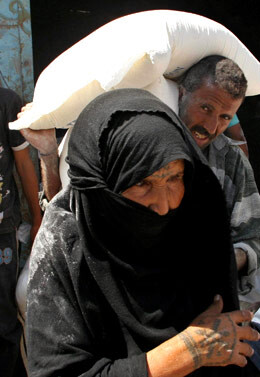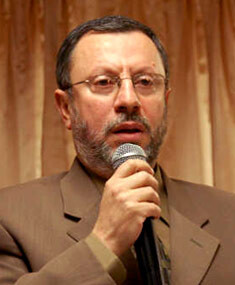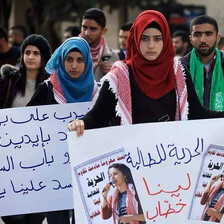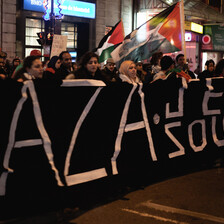The Electronic Intifada 4 April 2007
[…PART 1]

“Increasingly dependent on humanitarian handouts”: Palestinians receive aid from UNRWA in Rafah, southern Gaza Strip, 18 September 2006. (Hatem Omar/MaanImages)
Despite the blockade, Palestinians have not acceded to these conditions, based, as they are, not on any concept of justice or legitimacy, but rather on the perpetuation of occupation without costs. In response, the U.S. administration, as it once attempted to criminalize resistance and demand Palestinians jail and imprison other Palestinians for the benefit of the occupier, has attempted to foment a civil war among Palestinians in the West Bank and Gaza, seeking out willing collaborators for funding and military training. Nevertheless, the commitment of the Palestinian people in their entirety to resisting this attempt has carried the day, despite the best efforts of U.S. envoys. The U.S. government’s war on Palestine, however, has not been limited to the massive support of the oppressor while attempting to isolate the oppressed — it has centered efforts on the Arab League summit in Riyadh taking place this week, attempting to pressure the Arab regimes taking part in the summit — many of whom maintain their power despite despotism and corruption through the support of the U.S. — to relinquish their support for the most basic of Palestinian rights: the right of Palestinian refugees expelled from their land to return to their original properties, homes and lands. The return of six million Palestinian refugees, of course, disrupts the Zionist project to create an ethnically exclusive settler-colonial state on Palestinian land, and thus, generations of Palestinian refugees have been forced to pay the prices of Israeli apartheid, racism and colonialism, kept from their stolen land at the behest of an occupying power, an apartheid state ruling by the gun. The United States government, seeing maintenance of the Zionist regime in Palestine as a primary goal, has devoted itself, through envoys such as Condoleeza Rice, to seek an Arab negation of this fundamental right. However, as much as many of the Arab regimes may be dependent upon U.S. support, they also have legitimacy to retain among their own people, and it is clear that the Arab people do not support the attempts to undermine Palestinian rights sponsored by the U.S., in an attempt to bring about Arab normalization with Zionism.
In the meanwhile, Sami Al-Arian remains imprisoned. When his case, and those of his fellow activists, was brought to trial, despite a parade of witnesses including numerous Israelis, through the court, he was convicted of nothing, acquitted on eight charges, while the jury deadlocked 10-2 on nine others. This was the result of over a decade of FBI surveillance, under repressive legislation, in the post-September 11 political climate. It is no accident, however, that Sami Al-Arian was not convicted by a jury; in fact, it was so clear to his defense team that, rather than present their own defense, Al-Arian’s attorney, William Moffitt presented only four words: “I rest my case,” for Al-Arian’s defense, after the close of the prosecution case, and ten of the twelve jurors wanted to convict al-Arian of precisely nothing.

Mohammad Salah (Sh. Kifah Mustapha)

Dr. Abdelhaleem Ashqar (Sh. Kifah Mustapha)
Al-Arian’s case is not an anomaly in this regard. Mohammad Salah and Abdelhaleem al-Ashqar, two Palestinian community activists who were tried in Chicago on “racketeering” charges revolving around alleged “material support” to Hamas, were acquitted of all “terrorism”-related charges in February 2007. As William Moffitt, attorney for both Ashqar and Al-Arian, told the New York Times, “the Bush administration cannot win this war by trying to make criminals out of people who are fighting for their freedom … and two American juries have said that.” The Al-Arian and Salah/Ashqar juries made a very clear statement that the people of the United States are not interested in convicting Palestinian, Arab and Muslim community leaders of “terrorism” for aiding their community and supporting their people under occupation, which, despite the stand of the U.S. government, is not surprising.
While U.S. imperialism wages war on the Arab world, invades and occupies Afghanistan, continues an occupation in Iraq that has brought about the deaths of over 650,000 Iraqis as well as several thousand U.S. soldiers, funds a war on Palestine, funds and arms Israel’s war on Lebanon, threatens Iran, and attempts to criminalize all resistance to its rule as it imprisons thousands around the world, kidnaps and “renders” people to countries where they will be interrogated under torture, and holds hundreds of men at Guantanamo Bay in an international symbol of the apparent impunity of U.S. imperialism and its brutality, the vast majority of people within the United States have seen only misery from these policies. The minimum wage — on which many are forced to subsist — is barely adequate for survival. Millions of people in the United States have no health care, and costs of education have been skyrocketing increasingly out of reach for many. Youth of color in U.S. cities are put on a fast track to criminalization, targeted by often-brutal police and introduced at a young age to the world’s largest prison system. Women’s rights are increasingly under attack, while women — and men — immigrants, who form a major component of the U.S. working class, have been targeted for severe repression. Within the U.S., around solely domestic issues, the right to dissent is under attack, as the administration seeks ever-increasing authority to spy on citizens, tracking everything from library books borrowed to wiretapping millions of telephone calls. Meanwhile, the power of major multinational corporations appears to grow, virtually unchecked. And yet, the administration attempts to sell its bankrupt policies to the people of the United States through scare tactics, racist manipulation, and repression. It deems resistance organizations “terrorist” and attempts to link the resistance of a people against occupation and oppression and for liberation to hatred of Jews — a deceptive attempt to obscure the reality that Zionism, a political ideology based on racism and colonialism, and the regime it has created, is neither representative nor equivalent to Jewish people or Judaism as a religion — while waging a bitterly racist “war on terror” that has been, in reality, a “war of terror” for its victims around the world, including those in the United States.
Despite the resounding defeat for the government in Al-Arian’s case, it expressed its determination to re-prosecute Al-Arian
Despite the resounding defeat for the government in Al-Arian’s case, it expressed its determination to re-prosecute Al-Arian. In this environment, with the stress of years of persecution wearing on his family, Sami Al-Arian agreed to a plea bargain in which he would plead guilty to one count of “providing services” to “people associated with” Palestinian Islamic Jihad — the enumerated innocuous activities including hiring an attorney for his brother-in-law, Al-Najjar, and filling out immigration forms for a visiting Palestinian scholar — and swiftly be deported. Despite his over thirty years in the U.S., and the U.S. citizenship of his entire family, he was willing to accept this in order to finally win some peace for his family. However, despite the request made by the prosecution at the entering of the plea that Al-Arian be sentenced lightly, and primarily to time served, the judge on Al-Arian’s case, Judge James Moody — who had shown immense bias during the proceedings of the case, allowing numerous Israeli witnesses to testify about the costs of Palestinian resistance to Israel while allowing no testimony about the suffering of Palestinians, or Palestinian rights — sentenced him to an additional sentence while lecturing Al-Arian about his “guilt” in a manner that was, in fact, completely rejected by the jury in the case. Al-Arian and his co-defendants, like Salah and Ashqar, were not convicted, or even charged, with anything even related in the most remote degree to an attempt to harm anyone within the United States, or even the government or military of the United States — every charge against them pertained only to the Palestinian struggle for national liberation against Zionist occupation. Al-Arian was scheduled to be deported following his sentence, in April 2007. As part of his plea, Al-Arian secured a promise that he would not be called upon to cooperate in any additional government prosecutions. Nonetheless, Gordon Kromberg, a Virginia prosecutor who has assailed “the Islamization of America,” targeted Al-Arian as part of his fishing expedition in Virginia targeting Muslim organizations there through a wide-ranging grand jury. Despite Al-Arian’s plea, Kromberg has demanded Al-Arian testify before his grand jury — attempting both to lay Al-Arian open for charges of perjury and force him to serve as a witness against fellow community leaders and activists as part of a government witch-hunt.
The Al-Arian case is representative of an internationalization of political imprisonment in U.S. jails, alongside the impunity of Guantanamo Bay and its “military commissions” and U.S. secret detention around the world
Al-Arian’s hunger strike came in protest to his sentence, extended yet again, for “contempt” for his refusal to testify, holding to the terms of his plea agreement. The use of grand juries as fishing expeditions in political cases is neither new, nor restricted to this case — however, the attempt to force Al-Arian’s testimony in direct contradiction of his agreement illustrates once more what little regard the U.S. government has for its own principles of criminal justice, in pursuit of a goal of political repression. Of course, Sami Al-Arian is far from the only political prisoner in U.S. prisons. From the many prisoners of the Black Liberation Movement, to Puerto Rican political prisoners, to Leonard Peltier, targeted for his work with the indigenous national liberation movement, to the new charges against Black liberation movement activists from the 1970s, the criminal justice system in the U.S. has always held political prisoners in its wars against oppressed communities and oppressed nations within the United States. The Al-Arian case is representative of an internationalization of political imprisonment in U.S. jails, alongside the impunity of Guantanamo Bay and its “military commissions” and U.S. secret detention around the world.
However, Al-Arian’s case is not only an urgent call for support for his case, which is in urgent need of public pressure to make it clear that people in the U.S. will not stand for this persecution in our name (and with our money — the prosecution of Al-Arian is estimated to have cost the government $50 million of our tax dollars). Al-Arian, like his fellow political prisoners in U.S. jails, and his fellow Palestinian and Arab political prisoners in Zionist jails, is an inspiration to all of those who struggle for justice. Despite repression and despite the targeting of him and his family, Sami Al-Arian never ceased his work with the Palestinian, Arab and Muslim communities. While he was under investigation, being shadowed by the FBI and attacked in the press, he traveled coast to coast, continuing to speak out for justice in Palestine and in support of the liberation movement of his people. He is an example of the courage, dignity and bravery of those who resist. Resistance takes many forms — including, for many, like Al-Arian and the others who have been so targeted in these prosecutions — speaking, writing, educating the public and building community-based institutions capable of mobilizing many for justice in Palestine, and it is that example that stands as a reminder of the tasks that are incumbent upon all of us that are also committed to that cause.
The U.S. administration engaged these prosecutions not simply to target a few prominent activists and leaders. Rather, a major goal of repressive legislation and prosecution has always been to silence the community of support for the targeted cause, to quiet activism, to press people to withdraw from their political work for fear of also becoming examples. However, the only successful response to repression has always been struggle and defiance in the face of repression and not allowing our legal and legitimate work to fall silent in the face of repression. The greater the level of activity, the stronger the institutions of the community, the louder and more visible the movement of solidarity, the stronger we are as a movement — and the more repressive forces are pushed back. Indeed, Sami Al-Arian’s case is a striking example of repression, of the targeting of a community leader and — despite it all, his continued resistance and dignity in the face of attempts to force him to join the witch-hunt. With every event for Palestine, every act of solidarity and support for the Palestinian people, every Palestinian Arab community institution that is rebuilt, supported or encouraged, the criminalization of solidarity and the criminalization of resistance is pushed back. If that activism were not so crucial, vital and important, its leaders and activists would not have been targeted as part of the campaign against the national liberation movement. In much the same way, if the right to return were not the core and crucial issue in Palestine — the achievable, indeed, realistic, core issue in Palestine, it would not be under sustained and direct attack from the U.S. and its Zionist allies.
Therefore, in the face of repression, attempted isolation, and the war on Palestine, there is only one real choice and one real hope for those who seek justice in Palestine, and those who wish to build solidarity with Palestine within the United States — holding to the principles to which these political prisoners, those in U.S. and Zionist jails, have shown such deep and vigorous commitment: the right to return, the liberation of the land, the right to resist, the end of apartheid, the undoing of occupation, the freedom for the prisoners — and popularizing them as broadly, as clearly, and as visibly as possible, within all areas of society, while supporting the mobilization and organization of the Palestinian and Arab communities, as well as the organization of the Muslim community, wherever and whenever we can. In the face of such sacrifices, it is the least we can do, and a critical task not only for Palestine, but for all forces of liberation who stand in the crosshairs of imperialism, in order to achieve the decriminalization of solidarity and the empowerment of community organizing for national liberation.
Charlotte Kates is an organizer and activist with NJ Solidarity - Activists for the Liberation of Palestine and Al-Awda, the Palestine Right to Return Coalition. She is a 2006 graduate of Rutgers School of Law, and is admitted to practice law in New York and New Jersey.





